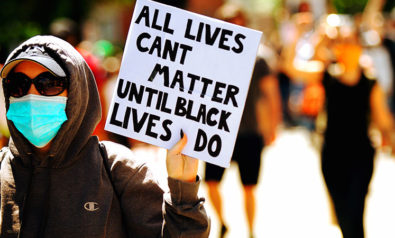There is no part of the globe that has not been affected by the novel coronavirus pandemic. At the time of writing, over 200 countries and territories have reported outbreaks as the global number of confined COVID-19 cases continues its steady march towards 4 million. But there is another pandemic that is threatening the health of our global community, one that is less novel but has its own deadly consequences — xenophobia.
While public health organizations across the globe are diligently collecting and reporting data on the growing number of COVID-19 infections, hospitalizations and fatalities, there is no centralized mechanism for collecting evidence of the global increase in xenophobic harassment, discrimination and violence. But patchwork reporting from NGOs, activist groups and the news media over the past two months demonstrates a wealth of evidence to suggest that incidents relating to the fear of foreigners are on the rise — and that no country is immune.
Doubling Down
Ultranationalist leaders and other ideologues who have long relied on xenophobic rhetoric to secure their own power have doubled down of the canard of foreigners as vectors of disease. In the United States, President Donald Trump has repeatedly defended his own use of monikers such as the “Chinese virus” and the “Wuhan flu,” as well as the use of the “Kung-Flu” by members of his administration to refer to the origin of the coronavirus. In India, Dilip Ghosh, president of the West Bengal unit of the Bharatiya Janata Party, claimed that the coronavirus was God’s revenge on China for “destroying nature.”
In Brazil, Education Minister Abraham Weintraub suggested that COVID-19 was a part of China’s plans for “world domination” and mocked the way people from China pronounce his country’s name. In Kenya, a Facebook post went viral in which a member of parliament wrote that if the Kenyan government did not forcefully quarantine Chinese nationals, he gave constituents “his permission to chase away and stone any Chinese people within their vicinity.”
Will We Ever Know the True Origin of COVID-19?
The effects of this rhetoric can be seen in the ways that people of Chinese descent have been publicly harassed and discriminated against in recent weeks. In mid-March, the Los Angeles-based Asian Pacific Policy & Planning Council launched an initiative called STOP AAPI HATE, to track bias incidents against the Asian American and Pacific Islander community in the United States. In its first two weeks of data collection, STOP AAPI HATE received over 1,100 reports that included verbal harassment, workplace discrimination and denial of public accommodation.
In Thailand, police instructed a restaurant owner in Chiang Mai to remove a sign that denied service to Chinese people, but suggested instead that they replace it with one written in Chinese that read “We ran out of food.” In Northern Italy, Chinese-owned businesses were vandalized by supporters of the far-right Forza Nuova party, who plastered posters that read “Coronavirus? Buy Italian. It’s a moral duty” on the storefronts.
Excited Into Violence
But the harmful effects of xenophobic rhetoric are not limited to acts of discrimination and intimidation or targeted at one narrowly specified national identity. The fear and prejudice stoked by xenophobia is too promiscuous, and too easily excited into violence. In Israel, an Indian immigrant and member of Israel’s Bnei Menashe community was hospitalized after being beaten by two men who believed him to be Chinese. In London, a Singaporean student at University College London was left with broken facial bones after being assaulted in the street by a group of teenagers.
In Texas, a man was arrested for attempted murder after stabbing three members of a Burmese family — as well as a store employee who attempted to intervene — inside a big box retailer. In China, the mistreatment of African nationals living in the “Little Africa” neighborhood of Guangzhou sparked diplomatic tensions between China and the African Union and prompted the US Consulate General to issue a travel advisory that warned African Americans to avoid the city.
New waves of xenophobic sentiment such as the ones currently being stoked by the COVID-19 pandemic can exacerbate existing tensions or be exploited by racist and ultranationalist groups hoping to further their goals during a time of crisis. In Kazakhstan, 10 people were killed and another 178 injured during anti-Dungan riots that pushed thousands of the ethnic Chinese minority over the border and into Kyrgyzstan.
In Iran, state-funded media has seeded conspiracy theories claiming the novel coronavirus is a bioweapon engineered by Israel and the United States. Similar conspiracies have been promoted by white supremacist and neo-Nazi groups, who have also been reported to be discussing ways to weaponize the virus and use violence to further disrupt the already overburdened health-care systems.
Unfortunately, the incidents listed here account for only a small fraction of the xenophobic acts of harassment, discrimination and violence that have taken place since SARS-CoV-2 was first identified at the end of last year. There are undoubtedly more to come. But as the world continues to coordinate its response to the pandemic, it is vital that political leaders, policymakers and ordinary citizens remember that the virus itself knows no nationality and acknowledges no borders. It is a threat to us all, and we must all fight it together.
*[The Centre for Analysis of the Radical Right is a partner institution of Fair Observer.]
The views expressed in this article are the author’s own and do not necessarily reflect Fair Observer’s editorial policy.
Support Fair Observer
We rely on your support for our independence, diversity and quality.
For more than 10 years, Fair Observer has been free, fair and independent. No billionaire owns us, no advertisers control us. We are a reader-supported nonprofit. Unlike many other publications, we keep our content free for readers regardless of where they live or whether they can afford to pay. We have no paywalls and no ads.
In the post-truth era of fake news, echo chambers and filter bubbles, we publish a plurality of perspectives from around the world. Anyone can publish with us, but everyone goes through a rigorous editorial process. So, you get fact-checked, well-reasoned content instead of noise.
We publish 2,500+ voices from 90+ countries. We also conduct education and training programs
on subjects ranging from digital media and journalism to writing and critical thinking. This
doesn’t come cheap. Servers, editors, trainers and web developers cost
money.
Please consider supporting us on a regular basis as a recurring donor or a
sustaining member.
Will you support FO’s journalism?
We rely on your support for our independence, diversity and quality.






























